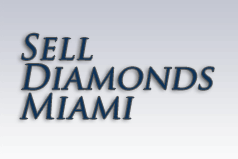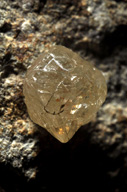


The ABC's of selling your diamond
Everyone's experience when selling their diamond is different. A diamond can be significant in financial as well as emotional terms, but if you've decided to part ways with your stone, here is what you can expect.
Value
Rarity = Value

A rough diamond
Value is primarily influenced by rarity. Large, gem-quality, diamonds are rarer than smaller ones, and the parameters that diamonds are graded on (the four 'C's) indicate it's rarity also. The grading scales one which diamonds are judged, indicate not only the desirability of those stones, but also their rarity. Flawless and clear white diamonds are actually quite rare in nature. rough diamonds are filled with cracks and inclusions. From the initial stage of a rough diamond the gem cutter must find contiguous sections that are free of cracks and large inclusions and extract the largest possible area. The result is a gem quality diamond, but the amount removed in the process is significant, and the actual size of the final diamond, when extracted, will be relatively small.
A diamonds value depends on demand
Like all commodities a diamond's value can vary with demand. Short term trends tend to be small, however, but they can have an impact on valuation. Any diamond buyer will need to take into consideration the market demand for any stone.
Appraisals and market value
It's unfortunate that local jewelers often overestimate the value of their customers diamonds. They often have a display case filled with jewelry at retail markup, or maybe they sold the diamond initially, but whatever the reason, they tend to value the market value too high. If you only have a local jewelry store appraisal it may not be accurate with regards to what the cash value of the stone is.
Insurance or Replacement Value
These too, are often exaggerated. The likely hood that the insurance claim will ever need to be paid is low, and it give peace of mind to have the value be as high as possible.
Certifications
Certification and value
Certifications do not increase the objective value of a diamond, they can be a good reference document, but the diamond is unchanged. Having a certificate can make the process of selling your diamond easier for buyer and seller. It ensures that the diamond is not a manufactured type, that it hasn't been clarity enhanced, and gives at least one independent evaluation of the stone. Certification also serves as a portable representation of the diamond for the purpose of determining value.
No all Certs are the same.
Certifications also vary in quality. The gold standard in certification is the Gemological Institute of America (GIA), in New York, NY and San Diego, CA, due to their consistency and their accuracy of grading. Certification from GIA can cost from 100 to 500 dollars, depending on the weight of the diamond. GIA certification is intended to provide assurance that the diamond is: Natural, accurately graded, and, is not clarity enhanced. There have even been rare occasions (such as this incident in Antwerp) where GIA certificates are forged to pass off clarity enhanced diamonds as natural. If imitation is the sincerest form of flattery, perhaps forgery is an indication of quality.
While we do not recommend obtaining a certification simply for the purpose of selling your diamond, if you chose to do so, we recommend GIA above all others. We view GIA grading reports as almost infallible accurate.
Can I get more cash for my diamond if I get it certified?
Probably not. Certification is helpful in the exchange of diamonds only to the extent that it lets both buyer and seller know exactly what is being traded. In the absence of certification, the diamond must be inspected physically. Our diamond buyers are GIA trained and have many years of experience, their conclusions will generally be the same. It can make the process of selling more expedient, but the certification takes time and money, only you can decide if that it's worth it to you.
With over 20 years combined experience in the fine jewelry business, we have the expertise you need to correctly appraise your diamond. We have access to a vast jewelry buying network and can often help you get more money for your fine diamond. If you would like answers to questions about selling a diamond follow this link: Diamond Selling. To learn more about our diamond buying services follow this link: Diamond Buying Service. If you have any additional questions or need any information not on this web site, please feel free to contact us by following this link: Contact us

Call us toll-free:
1(888)411-9250
- or -
Email Us Direct
